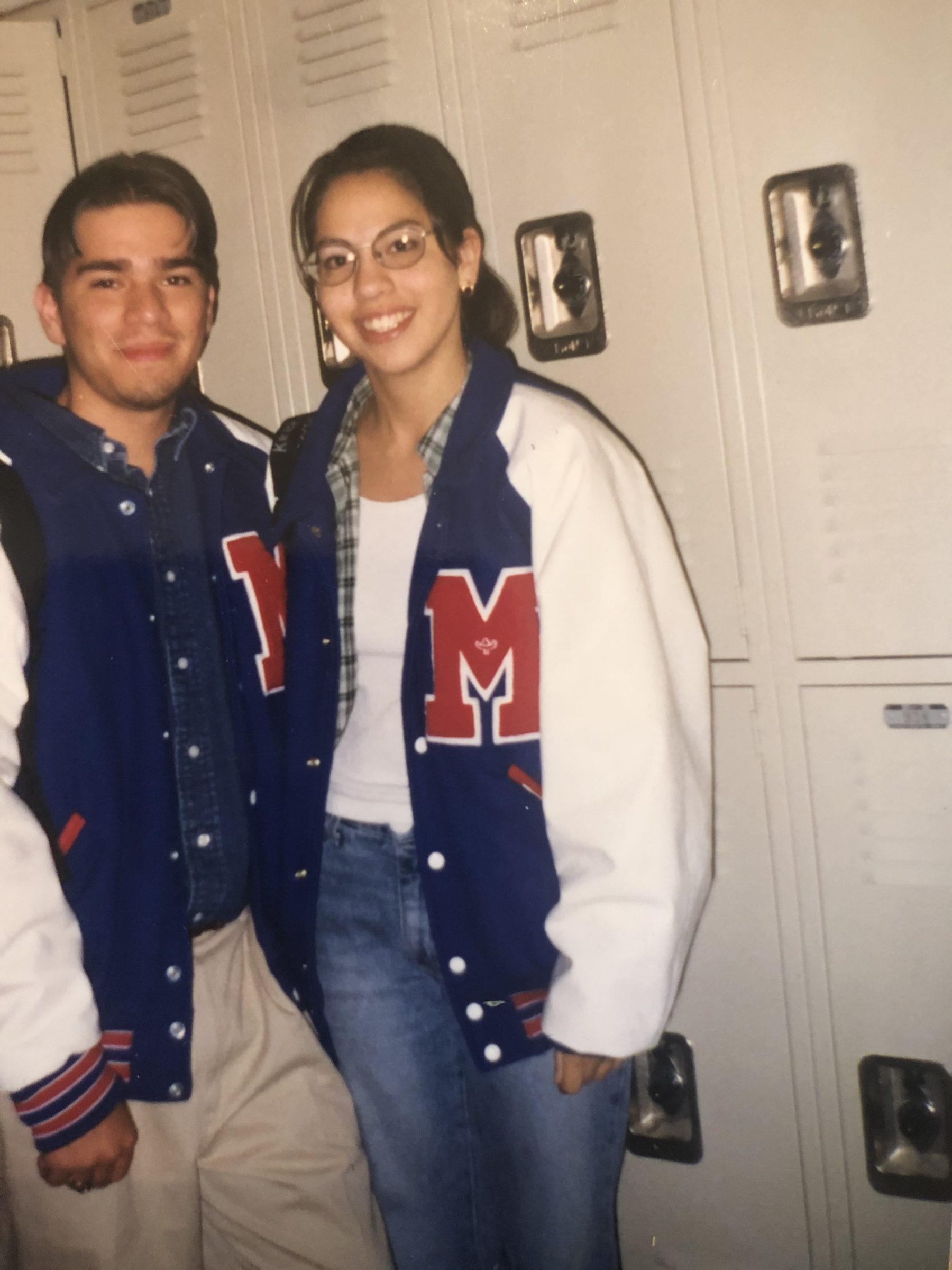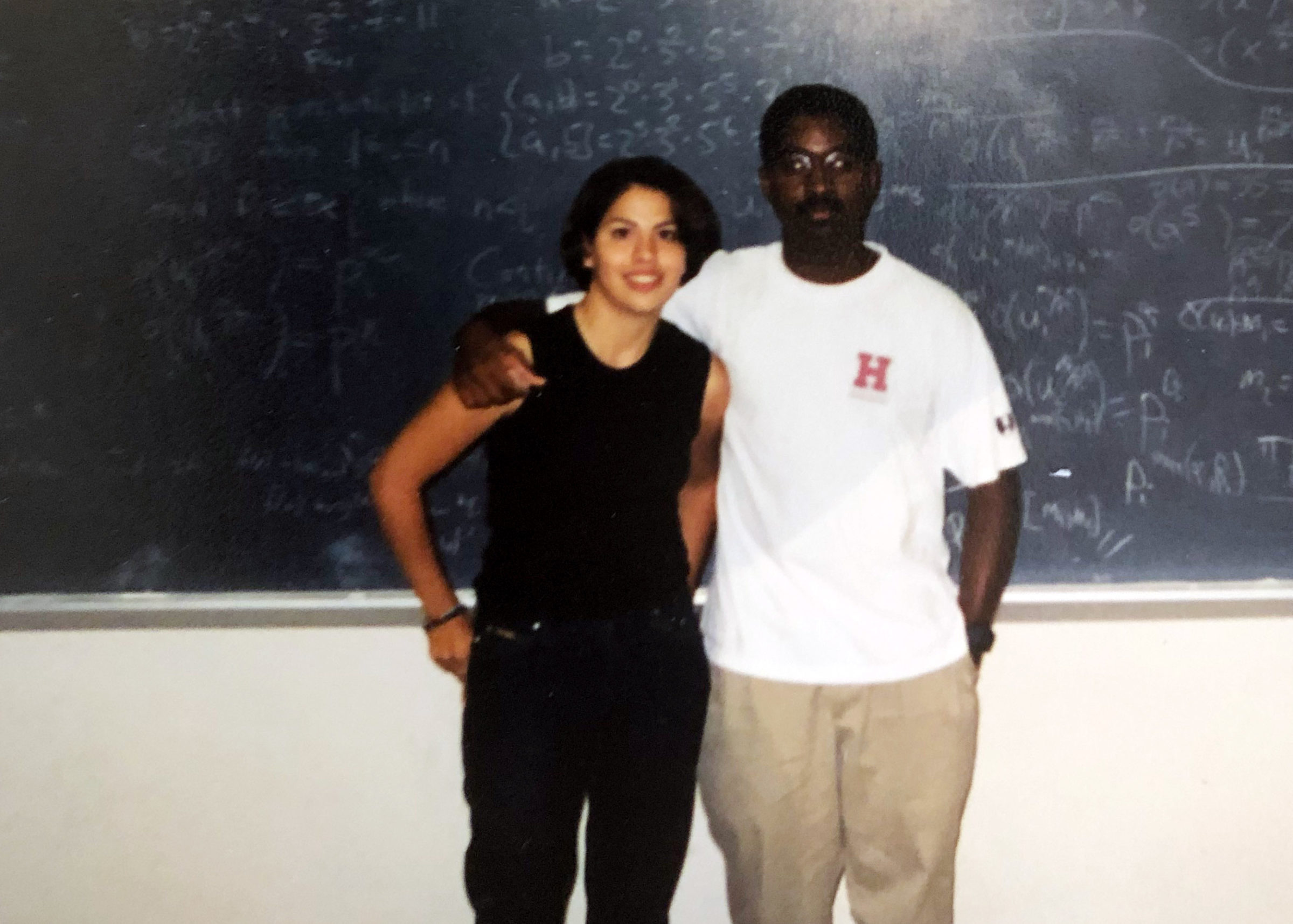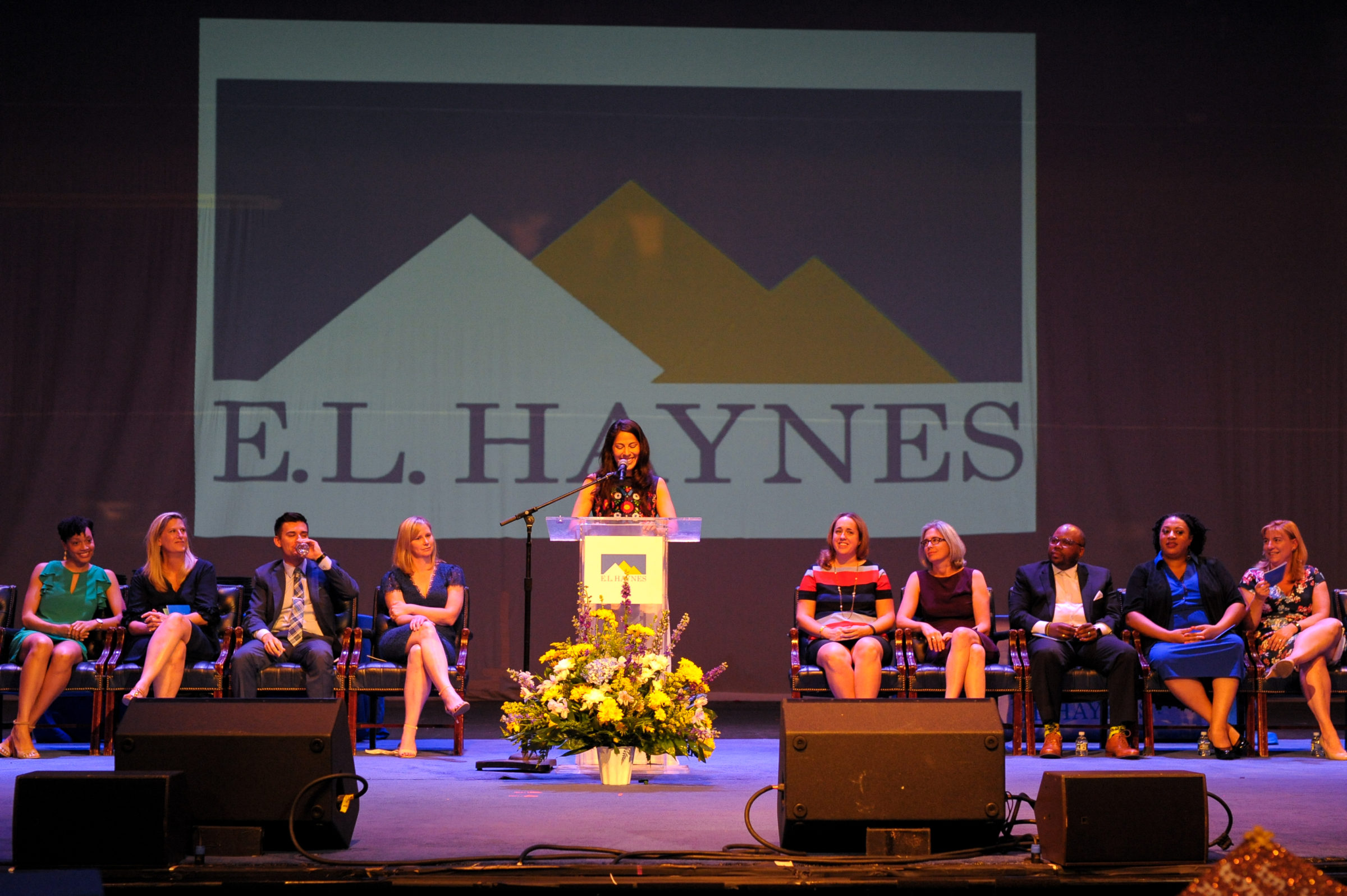“Marisol’s unwavering commitment to students is observable every time you step into the classroom—it’s a feeling—one where you’re seen, where your voice is valued, and where your strengths are recognized. Alums always attribute their strongest preparation for college-level writing expectations to the rigor of AP English Language and the detailed feedback Ms. Castillo provided. For the past few years, Marisol has served as mentor teacher for multiple teaching residents, most of whom have continued to grow in our E.L. Haynes community. It’s one signature element of her commitment to our community—the engagement she invests in professional development through coaching conversations and collaboration with peers. I am grateful for learning alongside her the past eight years, the intentionality she brings to every conversation, and her willingness to devote so much to being on the E.L. Haynes team!”
Emily Hueber Stoetzer
Principal, E.L. Haynes High School
Marisol Castillo, born in California and raised in San Antonio, Texas, realized at the early age of 14 that she wanted to be a teacher, always thinking she would be a math teacher. Her desire to teach stemmed from her love of math, and though a few years later a Stanford University undergraduate calculus class would change this trajectory, it would not change her calling as a teacher.
The summer after choosing to go into education, Marisol attended math camp at Texas State University in San Marcos, Texas. Her high school, which was 97% Latino, did not prepare her for what she would encounter at Texas State, where she would be one of only a handful of people of color. Whereas she was a high performer at her high school, “this math camp kicked my ass,” she recalls.

But, what made this experience transformative was not necessarily the camp or the content itself, but that one of her teachers was also at Texas State that summer working on her Master’s degree.
This teacher’s story was both aspirational and inspirational to Marisol, and over the course of the summer this teacher took the time to provide her lots of independent academic support. Through her mentorship Marisol learned the importance of persevering in the face of obstacles. “It was my introduction to growth mindset, the idea I could contest the belief in a fixed intelligence, and what it takes to learn from and not be defeated when your sense of self and identity are questioned so intensely.”
Her time at math camp made her realize that she too wanted to have that type of impact on others, and she continued to return to the math camp, for two more years as a participant, and then three years as a counselor. It was at this camp where Marisol first learned about what it means to build a truly inclusive education since the camp’s demographics changed dramatically over her time there. And, as a counselor, she was charged with figuring out how to support all students. “I didn’t want to be Michelle Pfeiffer in Dangerous Minds. One person is only as powerful as the community, and I wanted to do this work in a place where people are mission-driven and no one is trying to do it in a vacuum.”

This experience showed her the power of being pushed by a person from within her own community, and that helped establish for Marisol the importance of always working within communities who share her background.
After graduating high school, Marisol attended Stanford University where she earned a Bachelor of Arts in Political Science and Comparative Literature, and then a Master of Arts in Education. Upon completing her degree, she started teaching in East Palo Alto, California.
While at Stanford she sometimes felt othered. Oftentimes conversations she had with peers were qualified with, “Given where you are from...” It would infuriate her. She thought about her peers in San Antonio, and how these conversations diminished their value. The inequality of that fueled her. “I had to realize that I didn’t need to compare my strengths and successes to others—that I could define them outside of what society expected (and didn’t) from me.” And that is what drove her to education and what she strives for as a teacher—to help students become the best versions of themselves not within limits or qualifiers.
After her time in East Palo Alto, she moved to New York City. While there, she further honed her teaching craft and then ultimately moved to DC.
Maura Marino, the CEO of EdForward DC, who taught with Marisol in East Palo Alto and who had historically helped Marisol with job searches, recommended she apply to be a founding teacher at E.L. Haynes High School in 2011. “Marisol told me she was moving to DC and was looking for a school that represented her values—a deep belief in all students, the importance of teaching within a strong professional community, a true partnership between families and schools, and the concept of learning as an authentic and engaging process. It was clear that E.L. Haynes was the place she was looking for.”
Maura says further of Marisol, “From the day Marisol started her career as a teacher, she has been a model for what we should all strive for in the profession. Marisol focuses on her craft and works to get better every day. She holds herself and her students to a high bar for excellence, and provides deep support to students to meet that bar. She connects deeply with her students and makes content come alive. She is humble and reflective, while also being a fierce advocate for her students. We are so lucky to have her in the DC teaching community and particularly at E.L. Haynes.”
The founding of the E.L. Haynes High School was intense—all classes were held on one floor of the building, while they were finishing construction and classes also occupied trailers. All students ate lunch in their classrooms, and there was not a time where teachers were not with students. “It felt like you were constantly on. You were constantly energized, but you also felt like you were drinking from a fire hose.”

Marisol reflected on the importance and power of Advanced Placement courses: “If we are really going to honor the rigor of Advanced Placement, we need students to elect to take them,” and the biggest challenge we face is “how to hold ourselves accountable such that the kids who take AP reflect the demographics of our school.” Further, she asks, “Am I really offering a class that meets our mission, or am I inadvertently designing a segregated space?” and “How do you work within the AP system to change it and make it more equitable?”
She answers these questions by working closely with 11th grade staff and building relationships with rising 12th graders to ensure she’s targeting a diverse group of students for the course. In partnership with other teachers, she helps students develop a growth mindset so students don’t track themselves. These probing questions and the work Marisol does to address them are reflective of her practice, her commitment to equity, and her drive to create a space within the school that empowers our students.
Marisol loves teaching English and especially AP Language because “it lends itself to teaching anything—it is super easy to be responsive to kids, because it is about skills and habits, and content can be acquired through any reading you put in front them.” She wants to give students access to texts for culture of power purposes, but also wants to include texts that are responsive to the students and their interests.
This is why next year she is excited to add a unit on fast fashion and its implication on the environment, and her favorite unit to teach, which she has done for the last four years, is on sustainable eating because “all of the kids hate it in the beginning and then are super bought in at the end.” It forces students to engage in challenging ethical questions, and think critically about something so basic that they engage in every day.
It is also why the one text she will never take out of her curriculum is Martin Luther King, Jr.’s Letter from Birmingham Jail. She does a deep dive with the students, analyzing the argument structure and the language. “It is a beautiful text with complicated arguments. It hits directly at why I teach English, and I can think of no better text to show students that words have power.”

“Teaching AP in general is a challenge because you are teaching such a wide variety of kids in a really rigorous environment. How do you get them to buy into the ride?” she asks. “I am willing to work as hard as they are to making it work.” She provides substantial feedback and instruction, but she also believes that the less she can make it about her and the more students work with each other the more they’ll succeed. That’s why she uses a study group model that teaches them to rely on each other before they come to her. Her emphasis is on setting study group norms, building community among the students, and how a study group not only empowers their own learning, but will prepare them for the rigor of college, when an instructor will not be as present in their lives as a high school teacher.
But all of this was before the COVID-19 closures. Now she finds herself preparing her students for an AP test that is vastly different from the original—one that will be done in 45 minutes and not hours, and accessible on a cell phone. It has required her to re-assess her practice and how she is working with her students.
“It is amazing how quickly a teenager can mess up their sleep schedule.” So, it requires constant hounding. And her struggles are similar to a lot of other teachers—restructuring her day, having students who are also balancing additional duties at home, and balancing her own parental duties at home. But, really, “I am reminded a lot about how much of my teaching is built on connecting with kids, face-to-face, in person.” It is a challenge, especially working with 12th graders, to create buy-in and a connection with them. The power and subtlety of a look from across the room to help re-center and re-engage a student is nonexistent in a virtual space. “The tricks you have just don’t work the same way.”
But Marisol remains hopeful and energized by the number of students who have been reaching out and some of the students who have thrived in these conditions, when they have more control over when and how they do their learning. “It reminds me how oppressive and rigid traditional learning can be, and I want to explore how I can replicate this flexibility in the walls of E.L. Haynes when we return. Then we can reach those students who might struggle to find their place.”
